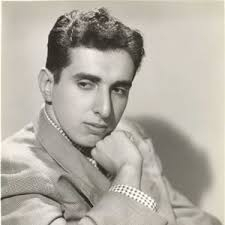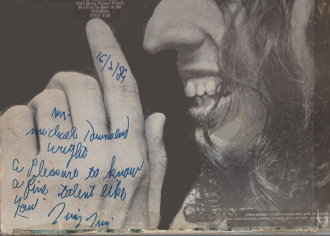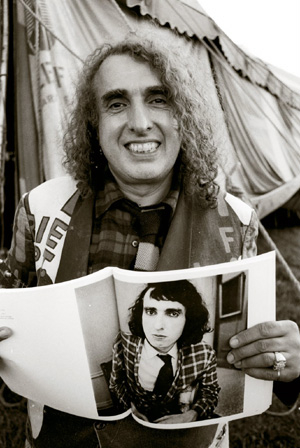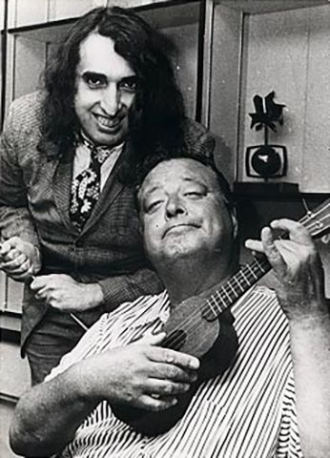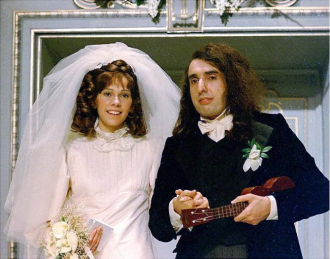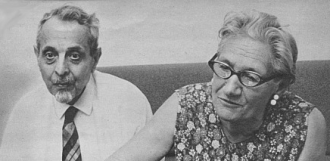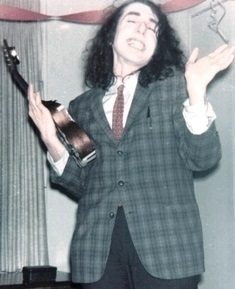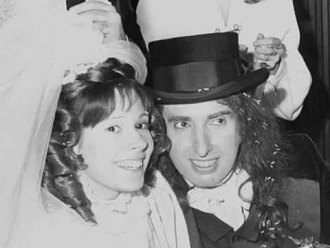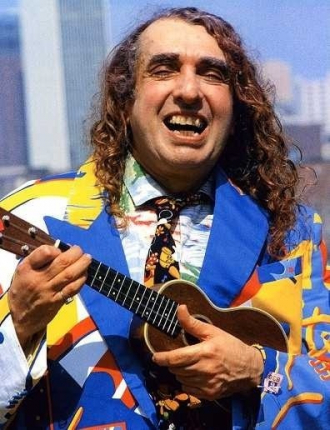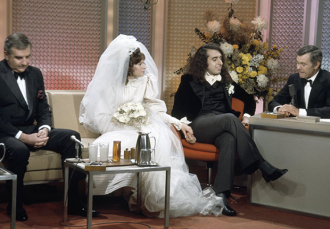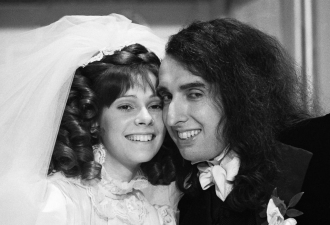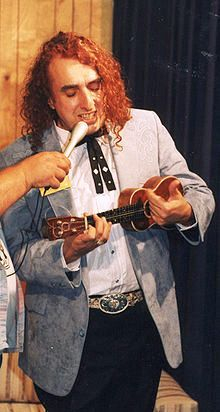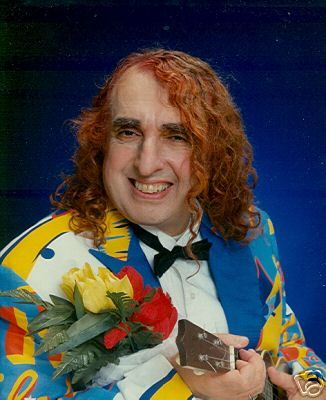Known as Tiny Tim, he was a singer and musician. He was dearly loved - 700 people attended his funeral.
Tiny Tim was born Herbert Buckingham Khaury on April 12th, 1932 in New York City, New York. His mother, Tillie Staff, was a garment worker and the daughter of a rabbi. She had immigrated from Brest-Litovsk, in present-day Poland as a teen in 1914. Herbert's father, Butros Khaury, was a textile worker from Beirut - present-day Lebanon - and was a Maronite Catholic priest.
Tiny Tim married three times: first, to Victoria Mae Budinger (Miss Vickie) (m. 1969; div. 1977); then to Jan Alweiss - married in 1984; and annulled in 1995; and last to Susan Marie Gardner- married in 1995 until his death.
He had one child from his first marriage: Tulip Khaury.
He is best remembered for his cover hits "Tiptoe Through the Tulips" and "Livin' in the Sunlight, Lovin' in the Moonlight", which he sang in a high falsetto voice.
Herbert displayed musical talent at a very young age. At the age of five, his father gave him a vintage wind-up Gramophone and a 78-RPM record of "Beautiful Ohio" by Henry Burr. He would sit for hours listening to the record. At the age of six, he began teaching himself guitar. By his pre-teen years, he developed a passion for records, specifically those from the 1900s through the 1930s. He began spending most of his free time at the New York Public Library, reading about the history of the phonograph industry and its first recording artists. He would research sheet music, often making photographic copies to take home to learn, a hobby he continued for his entire life.
At eleven years of age, Khaury began learning to play the violin, and later picked up the mandolin, and what would be considered his signature instrument, the ukulele, and enjoyed performing at home for his parents. During his recovery from having his appendix removed in 1945, he read the Bible, listened to music on the radio and sang along, and after that rarely left his room, except to go to school, where he was a mediocre student. After repeating his sophomore year of high school, he dropped out entirely, taking a series of menial jobs.
In a 1968 interview on The Tonight Show, he described the discovery of his ability to sing in an upper register: "I was listening to the radio and singing along; as I was singing I said 'Gee, it's strange. I can go up high as well.'" In a 1969 interview he said he was listening to Rudy Vallee sing in a falsetto, and "had something of a revelation—I never knew that I had another top register," describing it as a religious experience.
By the early 1950s, he had landed a job as a messenger at the New York office of MGM Studios, where he became ever more fascinated with the entertainment industry. He then entered a local talent show and sang "You Are My Sunshine" in his newly discovered falsetto. He started performing at dance club amateur nights under different names. To stand out from the crowd of performers he wore wild clothing and, after seeing an old poster of a long-haired Rudolph Valentino, grew his own hair out to shoulder length, and wore pasty white facial makeup. His mother did not understand Herbert's change in appearance and was intending to take her son, now in his twenties, to see a psychiatrist at Bellevue Hospital, until his father stepped in.
In 1959, he dropped all his other stage names, and performed as "Larry Love, the Singing Canary" at Hubert's Museum and Live Flea Circus in New York City's Times Square. While performing there, he signed with a manager who sent him on auditions throughout the Greenwich Village section of New York, where he played the ukulele and sang in his falsetto voice the song which would become his signature, "Tiptoe Through the Tulips", and performed unpaid amateur gigs.
Film critic Roger Ebert wrote: "I first saw Tiny Tim very early in his career, in Greenwich Village in the winter of 1962–63. There was a convention of college newspaper editors, and a few of us – I remember Jeff Greenfield coming along – went to the Black Pussycat and found ourselves being entertained by a man the likes of whom we'd not seen before. He was already locally popular."
In 1963 he landed his first paying gig at Page 3, a gay and lesbian club in Greenwich Village, playing 6 hours a night, 6 nights a week, for $96 per month. He performed for the next two years as "Dary Dover", and after that, "Sir Timothy Timms". After being booked to follow a "midget" (sic) act, his manager, George King, billed the 6'1" (185 cm) Khaury using the ironic stage name "Tiny Tim".
Tiny Tim appeared in Jack Smith's Normal Love (1963), as well as the independent feature film You Are What You Eat (1968) in which he sang the Ronettes song "Be My Baby" in his falsetto range; also featured was a rendition of Sonny and Cher's "I Got You Babe", with Tim singing the Cher parts in his falsetto voice, along with Eleanor Barooshian singing Sonny Bono's baritone part. These tracks were recorded with musicians who went on to be in The Band. The "I Got You Babe" performance led to a booking on the Rowan and Martin's Laugh-In, an American television comedy-variety show. Co-host Dan Rowan announced that Laugh-In believed in showcasing new talent, and introduced Tiny Tim. The singer entered carrying a shopping bag, pulled his Martin soprano ukulele from it, and sang a medley of "A Tisket A Tasket" and "On The Good Ship Lollipop" as an apparently dumbfounded co-host Dick Martin watched. For his third number on Laugh-In, Tiny Tim entered blowing kisses, preceded by an elaborate procession of the cast and, after a short interview, he sang "Tiptoe Through the Tulips".
In 1968, his first album God Bless Tiny Tim was released. It contained an orchestrated version of "Tiptoe Through the Tulips", which became a hit after being released as a single. For All My Little Friends (1969) was a collection of children's songs and was nominated for a Grammy Award. On October 7, 1969, Tiny Tim was able to take the ice before a charity hockey event at the hockey shrine Maple Leaf Gardens, with his beloved Toronto Maple Leafs, his favorite pro sports team. Wearing the skates and jersey of future hall of fame member (as a coach), Pat Quinn, Mike Walton and Jim McKenny helped him skate on the ice, his very first time trying to skate. He was quoted as saying "What a thrill! Just being on the ice was great!”. Reacting well to his inability to skate on his own, he said “I was always athletic spiritually, not physically".
When Tiny Tim first became well-known to the American public, pundits and journalists debated whether the character being presented was just an orchestrated act or the real thing. "It quickly became clear that he was genuine," however, and that he could probably be best described as "a lonely outcast intoxicated by fame" and "a romantic" always in pursuit of his ideal dream.
After his career highlights, Tiny Tim's television appearances dwindled, and his popularity began to wane. He continued to play around the United States, making several lucrative appearances in Las Vegas. John Wayne and Tiny Tim helped celebrate the 100th episode of Laugh-In, in 1971.
Herbert Buckingham Khaury died on November 30th, 1996 after giving a performance in Minneapolis, Minnesota. He was 64 years old.
See
Tiny Tim: Obituary.

